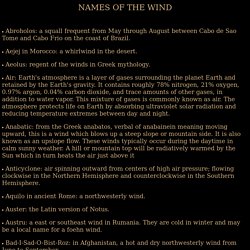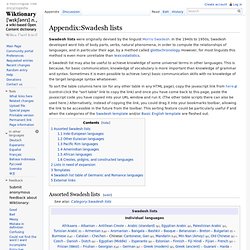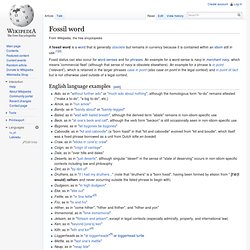

Names for the Wind. Abroholos: a squall frequent from May through August between Cabo de Sao Tome and Cabo Frio on the coast of Brazil.

Aejej in Morocco: a whirlwind in the desert. Aeolus: regent of the winds in Greek mythology. Air: Earth's atmosphere is a layer of gases surrounding the planet Earth and retained by the Earth's gravity. Wind Names. Memetics. Wiktionary, the free dictionary. Home : Oxford English Dictionary. Appendix:Swadesh lists. Swadesh lists were originally devised by the linguist Morris Swadesh.

In the 1940s to 1950s, Swadesh developed word lists of body parts, verbs, natural phenomena, in order to compute the relationships of languages, and in particular their age, by a method called glottochronology. However, for most linguists this method is even more unreliable than lexicostatistics. A Swadesh list may also be useful to achieve knowledge of some universal terms in other languages. This is because, for basic communication, knowledge of vocabulary is more important than knowledge of grammar and syntax. Sometimes it is even possible to achieve (very) basic communication skills with no knowledge of the target language syntax whatsoever. Assorted Swadesh lists[edit] Lexipedia - Where words have meaning. World Wide Words.
Gen Y’s New Words for 2009. NEW SLANG From povo and myselfish to retox and kward, the terms to know for 2009 While we understand the fleeting nature of slang and promise we are not “trying to make ‘fetch’ happen,” each year ushers in a bevy of new words you might hear and may even want to use (though we urge you to do so sparingly). 2009 introduces us to a vocabulary inspired by pop culture and technology, and here are a few of the favorites heard from the streets, our bloggers, and Gen Ys who know… RECESSION-INSPIRED SLANG Povo (po-vo) “Caroline, I can’t go out to dinner tonight: My pay cut has left me totally povo.”

Ex-hole n. Your ex boyfriend/girlfriend who dumped you via Post-it/text/drop-off-the-face-of-the-earth-disappearing-act and who is now flouncing around town with a new love interest “I bumped into my ex-hole this morning – she said she was so sorry that she cheated on me, blah blah blah. I wanted to puke.” Cupcake v. Hot Room n. DIGITAL SLANG Pwn (pone) v. Epic Fail n. Geequals n. New word mash-ups added to the 'sexicon' After reading about Is Anyone Up?
— the website that gives indie bands exposure in the literal sense — I rushed to my computer to check it out. Would you believe me if I told you I was less interested in naked bodies than in the language? In addition to naked self-promotion by bands, the site includes "revenge porn," revealing photos of just plain folks, generally submitted by ex-lovers.
Those considered unattractive are labeled "gnargoyles," a word created by combining "gnarly" or "gnarled" and "gargoyle. " As it happens, I have been blogging about the bottomless (in the sense of "inexhaustible," not "stripped from the waist down") font of new words refreshing the language through the process of blending. Back in 1871 Lewis Carroll coined the term "portmanteau words" for blends. Lewis Carroll may have called attention to portmanteau words or blends, but they predate him by centuries. "Bawme" is now spelled b-a-l-m. Colbert isn't the only one cranking out new blends these days. Scapes,%20holics,%20and%20thons. Wanderwort. A Wanderwort (plural Wanderwörter, German for "wandering word" ) is a word that was spread among numerous languages and cultures, usually in connection with trade, so that it has become very difficult to establish its original etymology, or even its original language.
The separation of wanderwörter from loanwords is not unambiguously possible, and they may be considered a special class of loanwords. Examples[edit] Tea, with its maritime variant tea and Eurasian continental variant chai (both variants have entered English), is an example[contradiction] whose spread occurred very late in history: tea is from Hokkien, specifically Amoy, from the Fujianese port of Xiamen, hence maritime, while cha (whence chai)[citation needed] is used in Cantonese and Mandarin.
See here for further details. References[edit] Jump up ^ The Pennsylvanian Sumerian Dictionary. English Verb Classes and Alternations: A Preliminary Investigation, Levin. LINGUIST List 4.1102: Beth Levin, English Verb Classes and Alternations. Sun 26 Dec 1993.

Verb Index to Levin 1993. Index from English Verb Classes And Alternations: A Preliminary Investigation, by Beth Levin, published by The University of Chicago Press, © 1993 by The University of Chicago.

All rights reserved. This text may be used and shared in accordance with the fair-use provisions of US copyright law, and it may be archived and redistributed in electronic form, provided that this entire notice is carried and provided that the University of Chicago Press is notified and no fee is charged for access. Archiving, redistribution, or republication of this text on other terms, in any medium, requires both the consent of the author and the University of Chicago Press. This file contains the index from English Verb Classes And Alternations: A Preliminary Investigation, by Beth Levin, published by The University of Chicago Press, copyright © The University of Chicago, 1993. Beth Levin Department of Linguistics Stanford University Stanford, CA 94305-2150 USA bclevin@stanford.edu.
List of English back-formations. Fossil word. A fossil word is a word that is generally obsolete but remains in currency because it is contained within an idiom still in use.[1][2] Fossil status can also occur for word senses and for phrases.
